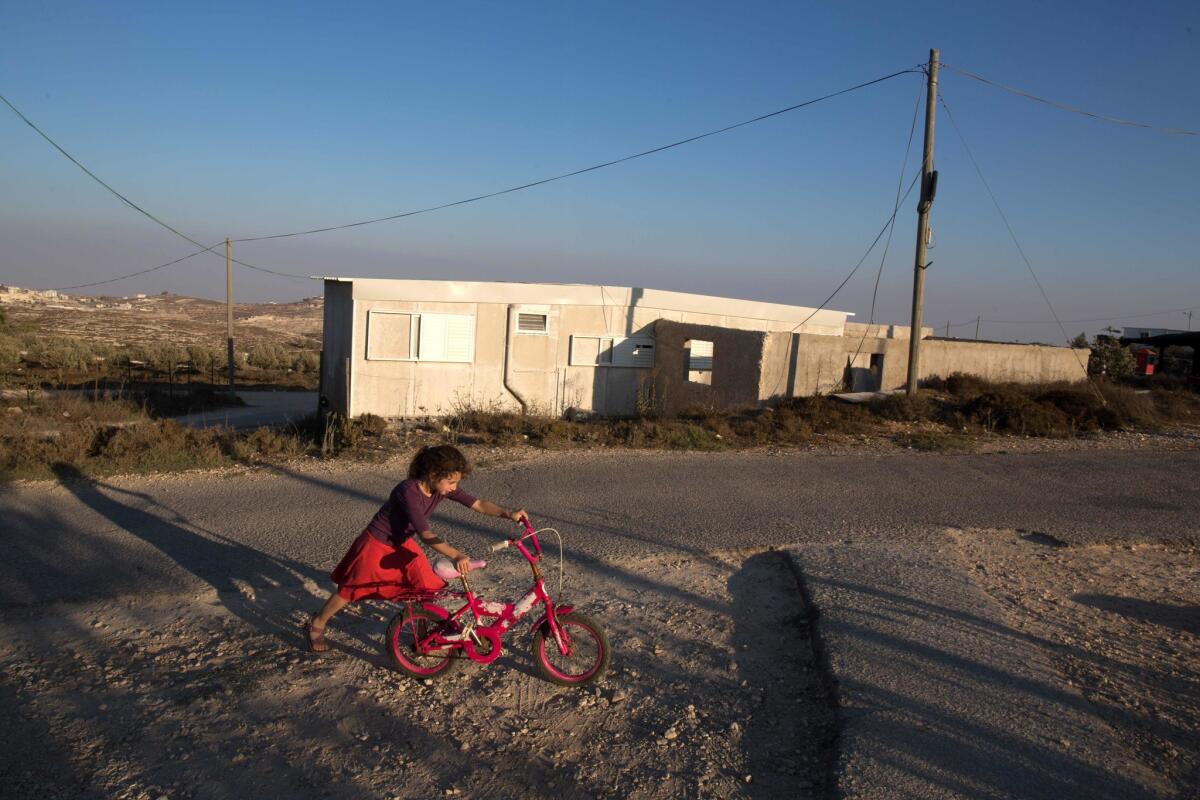In West Bank, showdown between Israeli settlers and Netanyahu looms over illegal outpost

Reporting from Amona, West Bank — This Jewish outpost, built illegally on Palestinian land, became a potent symbol of the resolve of West Bank settlers in 2006 after a center-left Israeli government sent bulldozers to demolish nine houses and religious activists tried to block them.
Riot police won that battle, but only after teenagers clinging to the empty houses were pried away.
Eyal Vidal and his wife moved to Amona two years later and into a mobile home not far from the rubble where the old structures once stood. Others have followed.
“We see value to settling the country and boosting settlements,” 33-year-old Vidal said from his wooden porch with a view of the Palestinian villages in the distance. “We wanted to be part of that.”
Now the settlers of Amona are bracing for a new showdown, this time vowing to defy a court-ordered deadline of Dec. 25 to evacuate.
The settlers present a dilemma for Prime Minister Benjamin Netanyahu’s government, which gets much of its political strength from their support but is now faced with the prospect of having to forcibly expel them. Desperate to avoid a repeat of 2006, it is searching for a legal fix that would allow them to stay.
Amona is becoming a defining moment for Israel’s moral and legal approach to settlements.
— Michael Sfard, lawyer for Yesh Din
Roughly 10,000 Jewish settlers live in similar outposts, hilltop communities of mobile homes that were hastily erected next to older West Bank settlements in the 1990s.
At the time, the government was engaged in peace talks with the Palestinians and, at least officially, not authorizing the formation of new settlements. But with the help of government bureaucrats and the support of right-wing politicians, settlers were encouraged to occupy the hilltops.
The fate of Amona, the largest of the outposts, could set a precedent for the other communities where Palestinians make property claims.
“Amona is becoming a defining moment for Israel’s moral and legal approach to settlements,’’ said Michael Sfard, a lawyer for Yesh Din, an Israeli nonprofit that along with Palestinian landowners has petitioned the Supreme Court to disband Amona. “It will tell a lot about the character of the occupation regime.”
In 2003, the government promised the U.S. it would evacuate several dozen outposts, and in 2005 an inquiry commissioned by the prime minister deemed them illegal. But most were never disbanded, and the settlers continue to enjoy protection by the army and government-sanctioned infrastructure such as electricity and telephone lines.
In 2012, a committee appointed by Netanyahu’s government recommended legalizing the settlements. More recently, the government has been trying retroactively to do just that, despite court petitions by human rights groups and Palestinians who claim the outposts are built on private property.
International diplomats have warned that legalizing the outposts could render the creation of a Palestinian state impossible and that the push to do so calls into question Israel’s commitment to a negotiated settlement with the Palestinians.
Legalization is “fundamentally undermining prospects for a two state solution,” John Kirby, a spokesman for the U.S. State Department, said in July.
Nickolay Mladenov, the United Nations’ special coordinator for the Middle East peace process, told the Security Council that preserving the outposts “appears to reinforce a policy, carried out over decades, that has enabled over half a million Israelis to settle in territory that was occupied militarily” during the 1967 Arab-Israeli war.
Amona residents have mounted a public campaign to remain. The outpost’s Facebook page calls on Israelis to stop “a second disengagement,” a reference to the evacuation of Gaza settlements that occurred in 2005. Settlers have been putting up posters warning of “horban,’’ a Hebrew term that invokes the destruction of the ancient Jewish temples in Jerusalem.
Government ministers and legislators have been visiting the outpost to express solidarity with the settlers and reassure them that there would be no forceful evacuations. Last month pro-settler demonstrators gathered outside the prime minister’s office to call for a solution.
“The baggage associated with 2006 implies that if the government decides to do something unacceptable to the settlers, there will be big clashes,’’ said Ofer Zalzberg, an Israel analyst at the International Crisis Group.
The government mulled legislation to legalize Amona and offer Palestinian landowners financial compensation, but it dropped the bill over concerns about diplomatic fallout and legal challenges. Some Cabinet ministers are still advocating for it.
In August, the Justice Ministry considered moving Amona residents to nearby plots whose Palestinian owners don’t reside in the West Bank. Critics say such a move would break with the Israeli policy not to build on lands of absentees.
Two miles east of Amona, in the Palestinian village of Ein Yabrud, Ibrahim Yakoub recalled harvesting tomatoes, chickpeas, and wheat where the settlers’ mobile homes now stand. An engineer who petitioned Israel’s Supreme Court against Amona, he said he hasn’t been able to reach his land in 18 years.
“All of my land is in their hands,’’ he said. Despite the court ruling, he said, “they have given us nothing. But they make excuses.”
Vidal said that if the government decides to evacuate Amona, the settlers will resist.
“We won’t go on our own initiative,’’ he said. “We will want them to have to come here and take us out.”
The future of the outpost is a test case for the government, he said: “If they destroy Amona, it will create an appetite to destroy other settlements.”
Mitnick is a special correspondent.
More to Read
Sign up for Essential California
The most important California stories and recommendations in your inbox every morning.
You may occasionally receive promotional content from the Los Angeles Times.










